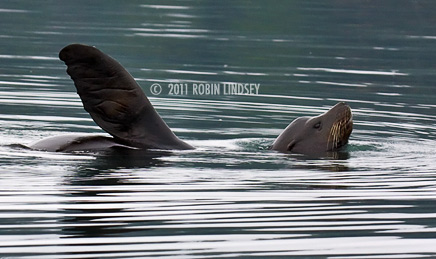Sailing sea lion sparks reports of "dead orca"
Jan/31/13 07:04 PM
Seal Sitters’ hotline was flooded with varying reports this evening about a dead whale, some thought to be an orca, just offshore at Constellation Park (aka Charles Richey Viewpoint).
Within minutes, our responders were on the scene scanning the waters with binoculars for the outline of a large marine mammal. In the darkness, our first responder was pretty certain that we were dealing with a sailing sea lion and not a stranded whale. We could see what appeared to be a flipper extended out of the water. However, at that point with virtually no light we could not say for sure that it wasn’t a small orca dorsal fin.
Then, as luck would have it, a KIRO 7 news van was nearby, heard about a dead whale and headed to Constellation. We asked the crew if they had lights to shine out over the Sound so that we might determine what we were up against. The strong beam illuminated the animal sufficiently enough to confirm that, much to our relief, it was indeed a resting sea lion. Huge thanks to KIRO’s Alison Grande and team!
 So, what exactly was that sea lion up to? Thermoregulating. Sea lions and other pinnipeds have a system of veins and arteries that transfer heat to the rest of their bodies and organs. This photo of a California sea lion in South Puget Sound shows how they extend their flippers out of the water; the blood in that less insulated part of the body absorbs heat from the sun or warmer air and circulates it through the body to their internal organs. Conversely, on a hot day, you may see a sea lion with flippers to the wind, cooling the blood which then circulates and reduces body temperature. This behavior sparks numerous phone calls each year to both Seal Sitters’ and NOAA’s hotline with reports of “entangled” animals and even sometimes reports of “whales”. Read more about sea lions on our website.
So, what exactly was that sea lion up to? Thermoregulating. Sea lions and other pinnipeds have a system of veins and arteries that transfer heat to the rest of their bodies and organs. This photo of a California sea lion in South Puget Sound shows how they extend their flippers out of the water; the blood in that less insulated part of the body absorbs heat from the sun or warmer air and circulates it through the body to their internal organs. Conversely, on a hot day, you may see a sea lion with flippers to the wind, cooling the blood which then circulates and reduces body temperature. This behavior sparks numerous phone calls each year to both Seal Sitters’ and NOAA’s hotline with reports of “entangled” animals and even sometimes reports of “whales”. Read more about sea lions on our website.
Among the many calls the hotline handled this evening about the “dead whale” was a frantic call from a woman saying she knew we took care of seals, but wanted to report a dead whale and didn’t know who else to call. Seal Sitters would like to clarify for the public that we are a full-fledged marine mammal stranding network, meaning that we respond to reports of ALL marine mammals, from whales to seal pups. Our warm and fuzzy name often gives people the impression that we only deal with seals. That is far from the truth. However, like most marine mammal stranding networks, the majority of responses are to seal pups trying to rest on shore.
Within minutes, our responders were on the scene scanning the waters with binoculars for the outline of a large marine mammal. In the darkness, our first responder was pretty certain that we were dealing with a sailing sea lion and not a stranded whale. We could see what appeared to be a flipper extended out of the water. However, at that point with virtually no light we could not say for sure that it wasn’t a small orca dorsal fin.
Then, as luck would have it, a KIRO 7 news van was nearby, heard about a dead whale and headed to Constellation. We asked the crew if they had lights to shine out over the Sound so that we might determine what we were up against. The strong beam illuminated the animal sufficiently enough to confirm that, much to our relief, it was indeed a resting sea lion. Huge thanks to KIRO’s Alison Grande and team!

Among the many calls the hotline handled this evening about the “dead whale” was a frantic call from a woman saying she knew we took care of seals, but wanted to report a dead whale and didn’t know who else to call. Seal Sitters would like to clarify for the public that we are a full-fledged marine mammal stranding network, meaning that we respond to reports of ALL marine mammals, from whales to seal pups. Our warm and fuzzy name often gives people the impression that we only deal with seals. That is far from the truth. However, like most marine mammal stranding networks, the majority of responses are to seal pups trying to rest on shore.







